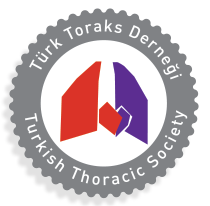Abstract
Abstract
Chronic granulomatous disease (CGD) is a rare, inherited primary immunodeficiency that is usually diagnosed at adulthood and is presented with recurrent bacterial and fungal infections. In this case report, two adult cases of CGD have been presented. A 29-yearold woman was referred to our clinic with hypoxic respiratory failure, with a pre-diagnosis of multidrug resistant tuberculosis (TB). Her lung biopsy had been reported as granulomatous inflammation, she hadnot responded to a 5 month anti-TB treatment. A complete medical history consisted of 4 occasions of treatment with anti-TB drugs and that her sister and brother had undergone TB therapy. However, since childhood, a TB bacilli had never been isolated microbiologically in the siblings. Patient’s parents were third degree consanguineous. The patient still had a purulent drainage around the operation site. Microbiological studies of the wound drainage and respiratory tract have not encountered any specific microorganism. Investigation of an immunodeficiency has proved CGD through nitroblue tetrazolium test. Her siblings has been diagnosed as CGD as well. Second case, a 19-year-old male, has been admitted to our clinic with complaints of fever, chest pain and an abscess lesion in the anterior chest wall. His medical history comprised 3 recurrences of pneumonia within last 2 years. In physical examination, a 3 x 5 cm fluctuant swelling lesion on the anterior chest wall. Radiologically, new pneumonic consolidations were detected. Sputum specimens did not provide any specific microorganism, cultures of the chest-wall abscess fluid grew aspergillus. His parents had been living in the same village but no consanguinity was known. Due to recurrent infections, immunodeficiency tests had been investigated. He was diagnosed as CGD due to dihydrorhodamin test. These two cases signify that, in our country where consanguinity is common, etiology of recurrent unexplained infections, abscesses and granulomas should be investigated and CGD should be in differantial diagnosis list.



